By Susanna Sigler, MHS Library Assistant
As part of an ongoing project to investigate WWI- and WWII-related materials at the MHS, I want to spotlight a collection that has stuck with me since I started here over the summer. This collection, or rather group of collections, consists of two scrapbooks, a box of photographs, and a case of medals belonging to Private First Class Robert E. Siegel. The scrapbooks were compiled by his mother, and the materials given to the Society after WWII.
Private First Class Robert E. (“Bud”) Siegel grew up in Brookline, Mass., as the son of art scholar Hannah Ruth London and attorney Benjamin M. Siegel. Eventually the family moved to 50 Fenway, only a two-minute walk from the MHS according to Google Maps. His family spent summers in Gloucester, where he was a member of the Gloucester School of the Little Theatre, as well as the Ogunquit Playhouse. Before he was drafted in 1943, he was working as an assistant stage manager at the Brattle Theatre in Cambridge.
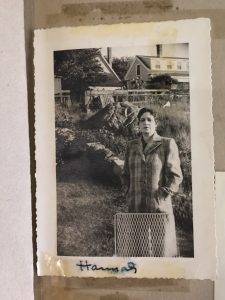
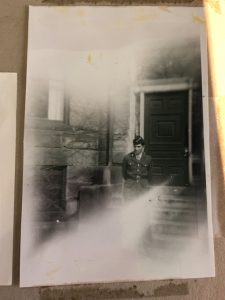
In a letter home, he expresses doubt about his looming commitment to the Army, and regret about leaving the friends he’s made. His humor shines through on the page, as well as the close relationship he has with his parents.
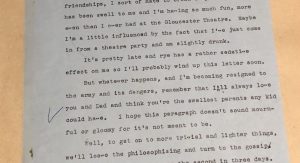
Only after a while of looking at these materials did I realize that the letters, at least the ones that are not handwritten, seem to have been typed by Hannah from her son’s originals.
There are a few more letters from Robert, in which he talks about the training at Camp Hood in Texas, his buddies, the variable weather, and his sweetheart Bernice (“Bunny”), a violinist who he meets at a Jewish Welfare Board event in Waco. “Pardon me if I rave about her a little,” he writes, and it’s impossible not to smile as he launches into a listing of her positive qualities, including being “a swell dresser,” “loads of fun,” and “will see a movie twice if I haven’t seen it.”
Turning these pages, it is also impossible to ignore why these materials were sent to the Society by Hannah London in the first place. More than dispatches from her son, more than summer snapshots, are the letters and notes from her and her husband’s colleagues, friends, and family.
Overseas only two and half months with the infantry, in the taking of a small town near France’s border with Germany, Robert Siegel was gunned down by a German sniper. He was 19 years old.
As his death occurred before the war ended, it was hard for his family to get further information. Fellow soldier Ivan Ragle later writes to Hannah with more details, including that Robert had acted as lead scout, saving the lives of the soldiers following behind him. He said that he’d finally decided to write after talking to his wife about Robert’s death, and attaches a photo of himself in uniform, standing in a garden. The photo in his obituary, from 2009, is of a gentleman decades older but with unmistakably the same face. This was one of multiple times while investigating this collection that I found myself with tears in my eyes.
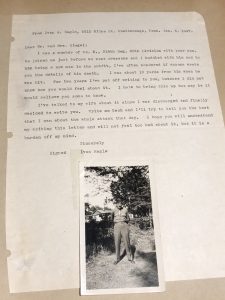
Jim Balasz, tasked with the job of writing the families of the soldiers killed, had an ongoing correspondence with Hannah. He tells her that he believes Robert deserved the Bronze Star for his actions, but notes that an officer would also have had to witness a soldier’s achievements in order to get paperwork in motion. He apologizes to Mrs. Siegel, citing Army red tape, and says he will try and visit them someday if possible.
Hannah London later cites Balasz in letters to the U.S. Army Administration Center, attempting to have her son awarded the Bronze Star for his actions. Hannah and Benjamin campaigned for decades after the war. When the army does send along his medals, she is informed that he is receiving the Bronze Star not for his specific actions but based upon his prior receival of the Combat Infantryman Badge, essentially a widening of the criteria. It is a terse exchange, and one that does not feel entirely resolved, even though the star rests in a case at the MHS with his other medals.
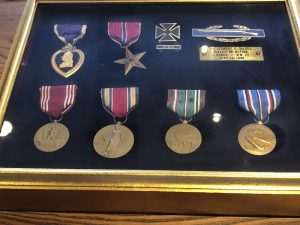
Keep an eye out for the next installment, where we’ll have a closer look at more letters and notes that make up the rest of the scrapbooks.
The Robert E. Siegel Papers can be viewed at the Massachusetts Historical Society.
Robert’s letters and the papers of Hannah Ruth London are located at the American Jewish Historical Society in Manhattan.

